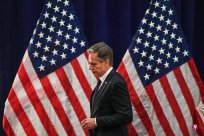(Bloomberg, Tokyo) The Senate election in Japan last month was more concerned than before the pre -election.Young people are generally indifferent to politics, and they can't be able to vote.
The Senate election, only 34%of voters from 18 to 19 were voted.This is also the least proportion of young voters since the age of 20 to 18 years ago since the age of 20 to 18.
The voting rate of voters in her 60s is currently unknown, but in the last Senate election in 2019, the voting rate of this age group reached 64%.
Japan is the country with the highest aging rate. It is on the crisis of "silver democracy", which means that the proportion of the elderly population has continued to rise, which has led to democratic politics to meet the preferences of elderly voters. Young voters feel ignored.
Experts point out that if young people's willingness to vote has not improved, national policies will continue to be biased towards elderly voters and cannot keep up with the pace of society.
The Liberal Democratic Party, which has little interrupted ruling since the founding of the Party in 1955, is a conservative party, opposed to same -sex marriage, and also opposed to the married couples using different surnames.
Japan's law stipulates that couples of the same household registration must use the same surname, and more than 90 % are the wife of the wife.The Liberal Democratic Party, which pursues conservative political routes, has not been approved to promote women's rights.
The founder of "No Youth No Japan", the founder of the rights protection organization, said: "Democracy should not be determined by age ... The current reality is the values that 18 years old, 19 years, and 20 years old (young people) attach great importance toIt is not really reflected in society. "
Since the reduction of the voting threshold in 2016, the Japanese government has tried to guide young people to care about politics through citizen education.For example, before the Senate election last month, Tokyo Agricultural High School allowed senior high school students to participate in the online question and answer to understand the degree of fit between the political parties and them.
The school's sociological teacher Hua Wan Yizi said: "If young students cannot decide which political party, many times they simply do not go to the voting station. It is important to let them know that adults may not be familiar with the elections.But the key lies in participating in voting. "
The Japanese media launched an online questionnaire called "Voting Suggestion Application". According to the policy preferences of the answer sheet, it is recommended to the party that can be considered to be selected.There is also a series of links that can be clicked to provide information and political platforms for political parties.
However, the above efforts have not achieved the expected results, and young people still find it difficult to challenge the status quo, and even prevents participating in political debate.
For example, on Twitter, a high school student in Northeast China posted posters about how to vote on the school, but the teacher was criticized for too much political meaning and must be removed.
Auxiliary professor of Political Department of Waseda University, Haruki Takugari, said: "It is not uncommon for this situation ... Teachers are very sensitive to political issues in school."
Compared with other countries, the political participation of young Japanese young people is significantly low.For example, in the 2020 presidential election in the United States, 51%of the 18 -year -old voters were voted among the 18 to 24 years old; in the 2017 Presidential election in South Korea, nearly 78%of the 19 -year -old voters exercised the right to vote.
Haruji pointed out that young people are more concerned about climate change than other aged groups, but if they do not actively participate in politics, their demands will be difficult to get the attention of politicians, so do not expect that the Liberal Democratic Party will make some certain some of them to make certain certain parties.Policy changes, such as eliminating coal -fired power generation.



